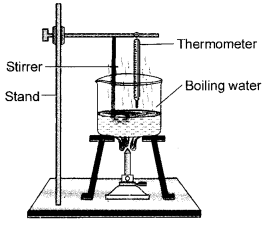Value Based Questions in Science for Class 9 Chapter 1 Matter in Our Surroundings
These Solutions are part of Value Based Questions in Science for Class 9. Here we have given Value Based Questions in Science for Class 9 Chapter 1 Matter in Our Surroundings.
Question 1.
Mohan was asked by his teacher to determine the boiling point of a liquid. He set up the apparatus as shown in the figure. He recorded the boiling point of the liquid as 140°C and reported the reading to his teacher. The teacher asked him to repeat the experiment after dipping the bulb of the thermometer in the liquid and also placing the beaker on a tripod stand covered with a wire gauze. After reading this narration, answer the following questions:

- Was the reading taken by the student correct ?
- What was the necessity of wire gauze ?
- How did teacher help the student ?
- What is the value based information associated with this ?
Answer:
- No, it was wrong. The bulb of the thermometer must dip in the liquid.
- If the beaker is in direct contact with the flame, it might crack.
- Teacher guided the student properly. By direct heating, an accident can occur and can cause serious injuries to the student.
- In the laboratory or in the Kitchen, we should never heat glass beakers directly on the flame. These are likely to crack. However, Borocil beakers can be heated on direct flame.
More Resources
- Value Based Questions in Science for Class 9
- HOTS Questions for Class 9 Science
- NCERT Solutions for Class 9 Science
- NCERT Exemplar Solutions for Class 9 Science
- Previous Year Question Papers for CBSE Class 9 Science
Question 2.
A student was determining the melting point of ice in the laboratory. The teacher was taking the round. He found that the student was not using any stirrer. Teacher asked him to use a glass stirrer and then determine the melting point of ice.
- Is the use of a stirrer necessary during heating ?
- What is its purpose ?
Answer:
- Yes, it is necessary.
- Stirring with a glass stirrer or glass rod provides uniform heating otherwise the results may not be correct.
Question 3.
Ashutosh was getting late for the office. He tried to sip boiling hot coffee from a cup. He felt very uncomfortable. His wife immediately brought a plate and asked him to sip the coffee from the plate. Ashutosh followed her advice and did not face any problem.
- Why was Ashutosh feeling uncomfortable ?
- How did sipping coffee from a plate was more comfortable ?
- How did wife help Ashutosh ?
- What is the value associated with it ?
Answer:
- Since coffee was very hot, it was not possible for Ashutosh to sip it hurridely. It could burn his tongue.
- A plate has more surface area than the cup. Evaporation becomes faster in this case. Since cooling is always caused during evaporation, the temperature got lowered. It became comfortable to sip coffee from a plate,
- With the timely help by his wife, Ashutosh could sip coffee quite comfortably and could reach office in time.
- We should never drink milk, tea or coffee when these are boiling hot. These are injurious to our throat. It is always better to allow them to cool. In case we are in a hurry, we must place them in a container with large surface area.
Question 4.
During vacation, Neha got an opportunity to visit a village. She found ladies cooking food in open pans. She sat with them for sometime and advised them to use pressure cookers instead of open containers in order to save time as well as fuel.
- How does cooking in a pressure cooker help in saving time ?
- How does cooking in a pressure cooker help in saving fuel ?
- What is the value associated with this gesture of Neha ?
Answer:
- Inside the pressure cooker, the temperature gets raised since the pressure is higher than the atmospheric pressure. The cooking becomes fast and this saves time.
- Since cooking takes place in lesser time, fuel is always saved.
- Neha was quite concerned about the welfare and safety of the villagers. She therefore, gave a very sincere advise.
Hope given Value Based Questions in Science for Class 9 Chapter 1 Matter in Our Surroundings are helpful to complete your science homework.
If you have any doubts, please comment below. Learn Insta try to provide online science tutoring for you.